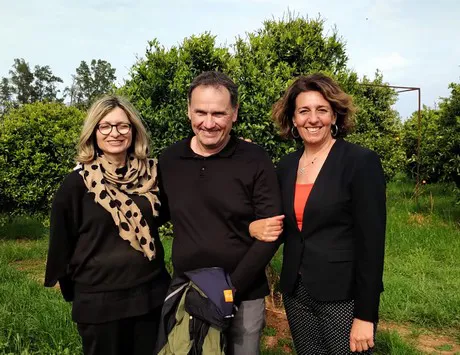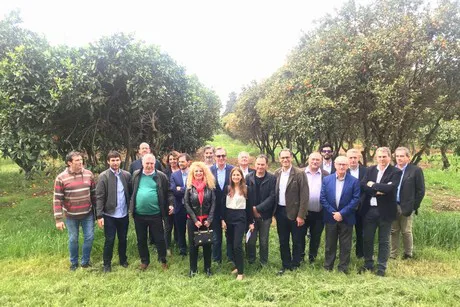The Citrus fruit Contact Group of the Mixed Fruit and Vegetable Committee France-Italy-Portugal-Spain, in which Portugal participated for the first time, held its annual meeting on 25 April 2019 in San Giuliano, Corsica.
The representatives of the four countries, which together make up the majority of Community citrus production, analysed the results of the 2018/19 campaign and discussed the impact of trade agreements between the European Union and third countries.
 From left to right: Simone Riolacci (Head of Communication at CIRAD-INRA), Simon Pierre Fazi (President of AOP Fruits de Corse) and Elena Aloisa Albertini (Coordinator of the Citrus Contact Group of the Mixed Fruit and Vegetable Committee).
From left to right: Simone Riolacci (Head of Communication at CIRAD-INRA), Simon Pierre Fazi (President of AOP Fruits de Corse) and Elena Aloisa Albertini (Coordinator of the Citrus Contact Group of the Mixed Fruit and Vegetable Committee).
On this issue, the Group has decided to draw up a document asking the respective Ministries and the European Commission that citrus fruits be considered "sensitive products" when negotiating trade agreements, and that the Commission first assess the economic impact of agreements with third countries on the internal market in the short and medium term, with specific investigations.

About phytosanitary issues, the Group highlighted the need to take measures to prevent the entry into the EU of plant diseases that may have harmful consequences for European citrus growing, in particular, Citrus Black Spot and Falsa Cidia.
Click here for an enlargement.
With regard to the Citrus Black Spot, the Group believes that Community legislation must regulate the possibility of precautionary closure of imports until a certain level of interception has been exceeded, as provided for by the previous legislation in force. At the same time, the same precautions must be applied to fruit intended for fresh consumption and fruit intended for processing.
Click here for an enlargement.
About the Falsa Cidia (Thaumatotibia Leucotreta), the Group has expressed its concern about the Community standard which requires the exporting countries themselves to establish the effectiveness of treatments similar to cold treatment, the only one with scientifically recognised effects.
Click here for an enlargement.
In conclusion, the need has been expressed to have a shared document aimed at safeguarding the European citrus fruit sector, indicating the Citrus fruit Contact Group as a common element for the protection of the economic interests of citrus fruit regions.
Click here for an enlargement.
At the end of the meeting, Portuguese producers offered to host the 2020 Contact Group meeting in the Algarve, the country's main production area.
